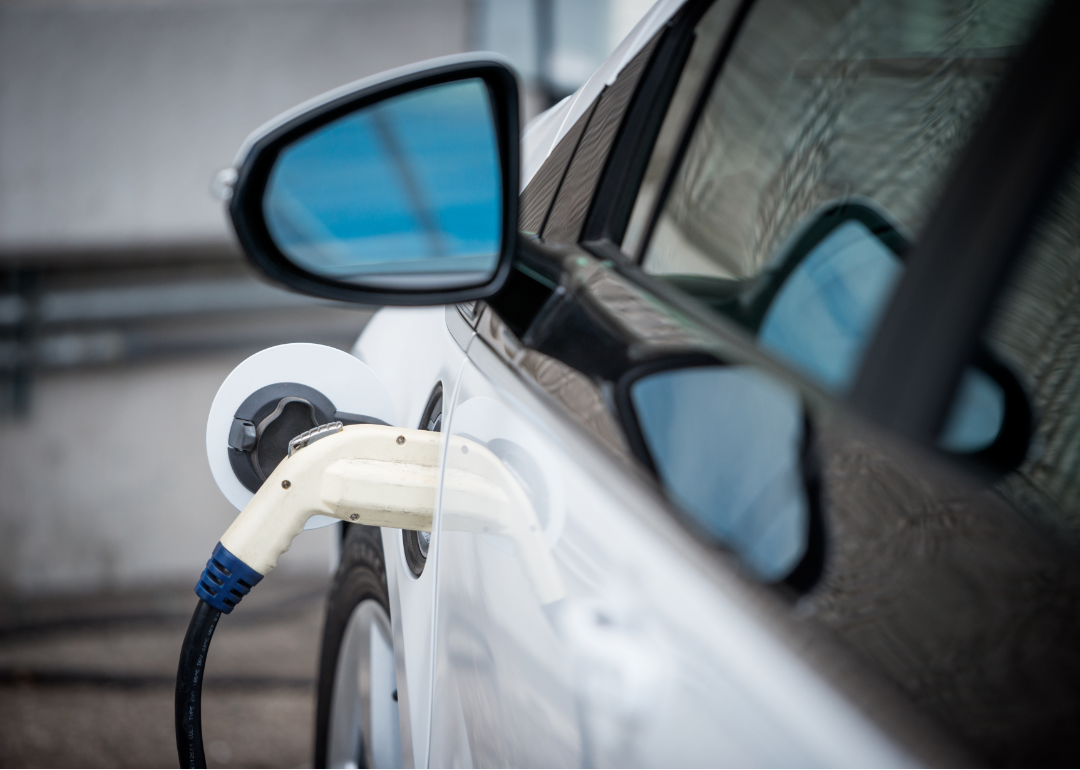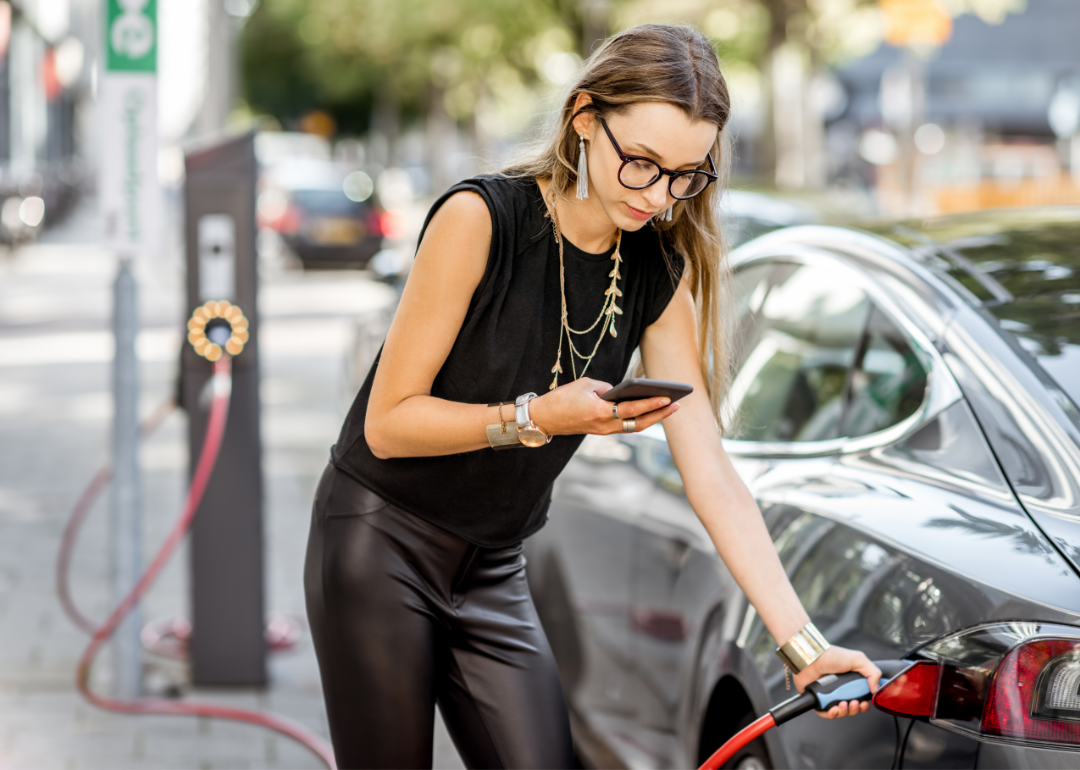
Canva
One of the biggest reasons to buy an electric vehicle (EV) or plug-in hybrid electric vehicle (PHEV) is the cost advantage of electricity versus gasoline. No matter where you live, electricity will be less expensive to use than gasoline. But calculating these costs requires learning a few new terms and rethinking the concept of a "full tank." Edmunds looks at the factors that determine the cost of charging an electric car, and we'll also share tips on how to save money in the long run.
KWh is the new MPG
For starters, you'll need to think in terms of kilowatt-hours per hundred miles (kWh), which is the EV equivalent of miles per gallon. Specifically, an electric car's energy consumption is measured in kilowatt-hours per 100 miles (kWh/100 miles). That's the EPA number you'll see on an electric car's window sticker and in the owner's manual.
To figure out your cost of charging at home, multiply your vehicle's kWh/100 miles figure by the electricity rate — the cost per kWh — for the time of day you'll most often be charging (more about that later). The output will be the cost per 100 miles.
Another way to calculate the cost of fully charging your electric car is to start from the total kilowatt-hours (amount of electricity) it takes to recharge the electric car's battery and multiply that by the price you pay per kWh for electricity. For example, if your electric vehicle's battery is rated at 50 kWh, and the price of electricity in your home is $0.23 per kWh, it would cost $11.50 to recharge a fully depleted battery.
Location and method of charging
So now we've established the basic formulas for determining how much it costs to charge an electric car, but where and how quickly you charge can have a major impact on the overall costs. Let's take a closer look.
Home charging (Level 1 or 2)
In most cases, EV charging will be less expensive at home, whether you use a 120-volt (Level 1) or 240-volt (Level 2) setup. That's because home electricity rates are less than those at third-party chargers, where the company that operates the machines needs to make a profit.
The price per kWh at home varies by location and the utility company. As of this writing, the cost of electricity ranges from $0.13 per kWh in Phoenix to $0.45 per kWh in Hawaii. Let's take the 2023 Chevrolet Bolt EV as an example, which has a 65-kWh battery. Assuming you're in Los Angeles, with an average electricity cost of $0.21 per kWh and a completely depleted battery, it would cost about $13.65 to charge the battery back to full.
Public chargers (Level 3)
The cost of a public Level 2 charger will vary greatly based on your location, the company operating the charger, and the station's pricing structure — per minute or per kWh. It's tough to pin down average costs for these stations due to these variables and the fact that most companies don't advertise their pricing until you're at the actual EV charging station.
Electrify America, a major EV charge station provider that does list some of its prices, currently charges $0.43 per kWh in a number of states such as Arizona, California, Florida, New York, Oregon and more. For time-based stations, Electrify America charges $0.03 per minute.
In other states, such as Georgia, Massachusetts and Texas, Electrify America determines its pricing by the speed of the EV charging station and the maximum power level your vehicle can accept. For stations operating at up to 90 kW, it costs $0.16 per minute. For faster stations that can push to 350 kW, it costs $0.32 per minute.
For example, if you owned a base-model Hyundai Ioniq 5 with its 58-kWh battery, it would cost $24.94 for a full charge at the $0.43-per-kWh rate. But at the per-minute pricing, the same Ioniq 5, which takes about six hours to charge fully, would run up a tab of about $58 using the $0.16 per minute station. If the price seems high, keep in mind that these locations aren't meant to be your main source of charging. Instead, they're meant for you to top off your car for a few hours while you run errands or grab a meal.
If you're going to be a heavy user of Level 2 public charging stations that charge by the minute, pay attention to the speed of the onboard charger for any EV you're considering. A car with a slow onboard charger will cost more to fill than one with a fast one. The differences can be huge: A base 2017 Nissan Leaf with the then-standard 3.3-kW onboard charger takes twice as long to charge as a 2018 or later Nissan Leaf with the 6.6-kW onboard charger. Thankfully, many EVs now come standard with a 6.6-kW or a 7.2-kW charger.
DC fast chargers (Level 3)
You'll find these stations in business parks and near shopping centers. As the name implies, these fast-charging stations can sometimes be the priciest since they cost significantly more to install and require more power to operate. In these cases, what you're paying extra for is the time you save. After 30 or 40 minutes, most EVs will have enough charge to drive a couple hundred more miles.
Electrify America often charges the same for Level 2 charging as for Level 3. The differentiating factor is the speed of the charging station. DC fast-charging stations with speeds greater than 90 kWh are the ones where the pricing enters a higher tier in locales subject to per-minute states.
Let's assume the same Ioniq 5 referenced above went to a 150-kW Electrify America station for 30 minutes. At $0.32 per minute, it would cost about $9.60. This may seem less expensive at first glance, but keep in mind that you're not on the charger for that long.
EVgo, another provider of fast-charging stations, uses per-kWh pricing that varies depending on the time of day. In California, prices range from $0.32 per kWh from midnight to 8 a.m. to $0.66 per kWh during the peak hours of 4 p.m. to 9 p.m. If you showed up with the Ioniq 5 at an EVgo station during peak times, it could cost about $38 for a full charge.
Tesla Superchargers
The Tesla Supercharger network is a series of charging stations specifically designed for Tesla vehicles, although the company plans to broaden access to other vehicle makes. Superchargers vary in speed but are mostly considered Level 3 or DC fast chargers.
According to Tesla's website, owners are billed per kWh when possible; otherwise, they are billed per minute. Each station has its own pricing, and Tesla owners can look up the price of the nearest Supercharger on their navigation screen. The pricing can also vary based on peak and off-peak hours. A ballpark figure of a Supercharger price in California is about $0.50 per kWh, according to Electrek. In a Tesla Model 3 Long Range with an 82-kWh battery, it would cost about $41 for a full charge.
For Supercharger stations that bill per minute, Tesla determines its price with a four-tier system, based on the charging speed:
- Tier 1: Charging at or below 60 kW, lowest price per minute
- Tier 2: Charging above 60 kW but at or below 100 kW, second-lowest price per minute
- Tier 3: Charging above 100 kW but at or below 180 kW, second-highest price per minute
- Tier 4: Charging above 180 kW, highest price per minute
Note that Tesla's website provides only the hierarchy above, as opposed to specific pricing.
Time-of-use electricity rates can save or cost you more money
Utility companies typically have two types of rate plans. Level-of-use plans are essentially "pay as you go." The electricity cost rises with your consumption. A kilowatt at month's end is likely to cost more than one used at the beginning of the month.
With time-of-use plans, you pay a certain rate based on the time, day and even season you're using electricity. The hours of 4 p.m. to 9 p.m. are typically considered "peak hours" and cost the most. Off-peak hours, usually the early mornings or late nights, are the least expensive. Some utility companies also have midpeak slots.
PG&E, one of the largest utility companies in the U.S., offers a time-of-use plan for its customers. During the summer months, off-peak electricity costs as low as $0.34 per kWh and jumps to $0.41 per kWh during peak hours. If you charged your Chevrolet Bolt EV during off-peak hours, it would cost about $22 for a full charge. Compare that to $26.65 during peak hours.
Some utility companies give you a designated baseline allotment of power. This will result in the lowest rates, but if you go over your allotment, the prices go up. With PG&E, off-peak power for customers who have gone over their allotment costs $0.42 per kWh, rising up to $0.49 per kWh for peak hours. This changes the figures for the Bolt EV above to $27 and $32, respectively.

Canva
How to keep your EV charging costs low
Here are some helpful tips on how to minimize your costs when you're charging your electric car.
Take advantage of free charging
Some automakers, such as Volkswagen, Toyota and Ford, will give you a certain amount of free charging as a perk of buying their electric vehicle. The free charging is either measured in time or kWh and often applies to chargers of a designated brand like Electrify America.
There are also free chargers to be found at places such as museums, dealerships, utility companies and certain businesses that offer the charging as a perk of visiting. Some may require you to download an app, while others may use other means to verify that you're actually a customer.
Become a member of charging station companies in your area
Most major charging station companies will offer EV owners significant discounts — roughly 25% to 35% — for creating an account, downloading their app and using their stations. The higher discounts will likely come with a monthly membership fee, but this can still provide value for those who often use the public stations. Another benefit to being a member is the ability to reserve a charge station so that no one else is using the station when you arrive. Reservations can cost a few dollars, but they are often waived in higher-membership tiers. Finally, these apps speed up the visit to the charge station because your payment information is already in the system and you can just plug in and connect with the app on your phone.
Switch to a time-of-use rate plan
As we discussed earlier, you're likely to save money by plugging in your EV after 9 p.m., rather than as soon as you get home from work. Some electric vehicles can be set to begin charging at a designated time, which means you can plug it in now and the charging won't start until later. Even charging in the morning is preferable as long as you unplug before peak hours.
Don't overstay your welcome at public chargers
Resist the temptation to charge your electric vehicle to 100% whenever you're at a public charging station. If it's a fast charger, you may only need about 20 minutes to give you plenty of charge for the day. Then, you can top off at home where it is less expensive. Even if it is a slower station, you want to aim for a 20% to 80% charge, as it will take less time and therefore cost less. The time it takes to charge an electric car from 80% to 100% can take nearly as long as going from 20% to 80%. Incidentally, it's not great for your battery to charge to 100% routinely.
While there are more factors to consider when determining the cost of charging an electric car compared to a gasoline-powered car, it is worth the learning curve because the costs are ultimately lower. For those who can do most of their charging at home, the savings are even greater.
This story was produced by Edmunds and reviewed and distributed by Stacker Media.




